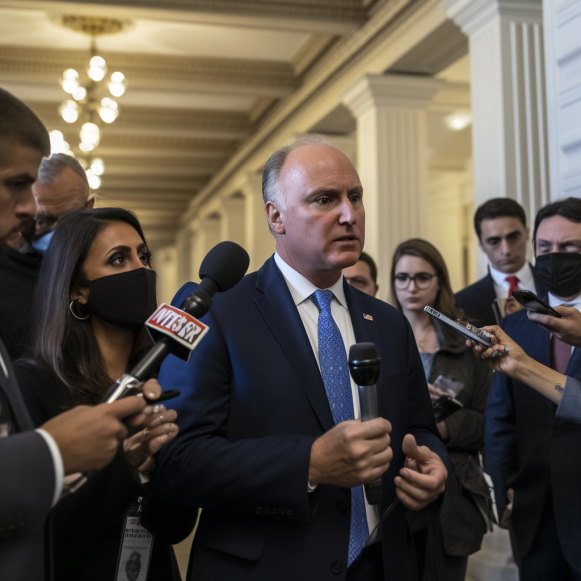GOP nominates Scalise to be the new House speaker

Scalise beat Rep. Jim Jordan 113-99, not clear when a full vote will be held
WASHINGTON (AP) — Republicans nominated Rep. Steve Scalise to be the next House speaker on Wednesday, but they struggled to quickly unite their deeply divided majority and elect the conservative in a public floor vote following Rep. Kevin McCarthy’s historic ouster.
House Republicans narrowly defeated Ohio Rep. Jim Jordan, the firebrand Judiciary Committee chairman, in private balloting at the Capitol in favor of Scalise, the current majority leader. Some regard the Louisiana congressman, who is battling blood cancer, as a hero after surviving a shooting at a congressional baseball game practice in 2017.
“We have a lot of work to do,” Scalise later said.
A House floor vote was expected, but tensions remain high among Republicans, who have brought the House to a halt with bitter infighting since McCarthy’s shocking removal last week. The House was called into a brief session, then adjourned indefinitely, with no indication of what would happen next.
Moving into a second week without a House speaker is an extraordinary moment of political chaos at a time of uncertainty at home and crisis abroad. Only ten months after Republicans swept to power with the intention of working as a team and running government more like a business, the GOP majority has strayed far from that goal.
“We need to make sure we’re sending a message to people all throughout the world, that the House is open to doing the people’s business,” Scalise said in a statement.
What remains to be seen is whether lawmakers who supported Jordan, the hardliner backed by Donald Trump, will back Scalise in what is sure to be a close vote by the full House. Democrats have easily nominated their leader, New York Rep. Hakeem Jeffries, to run against the Republican nominee.
Jordan said little after the vote, only that the GOP majority “is divided.”
Jordan did, however, offer to give Scalise a nominating speech on the floor as a show of support during a vote.
Rep. Don Bacon, R-Neb., a centrist leader, stated, “We do need to get a speaker in place so we can govern.”
“What we should have heard after the vote count today was, ‘I wholeheartedly support Steve.'” “Let’s rally around him,” Bacon said. “We did not hear that.”
Americans are paying attention. One-quarter of Republicans support a small group of Republicans’ decision to remove McCarthy as speaker. According to an Associated Press-NORC Center for Public Affairs Research poll, three in ten Republicans believe it was a mistake.
“We want to see the chaos end so that we can deliver for the American people,” presidential press secretary Karine Jean-Pierre said at the White House.
McCarthy, R-Calif., was ousted by a hard-right coalition of lawmakers, demonstrating what a disproportionate role a few lawmakers can play in selecting his successor.
In a floor vote, Scalise would need almost all Republican votes to defeat the Democratic opposition. Normally, a majority of 218 votes is required, but there are currently two vacant seats, lowering the threshold to 217.
Many Republicans want to avoid a messy House floor brawl like the one that occurred when McCarthy became speaker in January.
Republicans voted behind closed doors to reject a proposed rule change that would have attempted to ensure a majority vote before the nominee was presented for a full floor vote.
Without the rule change, Republicans are expected to agree to a majority-rules process. However, several lawmakers have stated their opposition to Scalise.
Rep. Marjorie Taylor Greene, R-Ga., said she voted for Jordan in private and would do so again on the floor. Rep. Thomas Massie, R-Ky., said Scalise was informed that “he doesn’t have my vote on the floor.”
Neither Scalise nor Jordan were seen as the obvious successors to McCarthy, who was ousted after the speaker led Congress to pass legislation averting a government shutdown.
All three men have been to this location before. In 2018, they were vying for the same position, with McCarthy and Scalise continuing their feud to this day.
After McCarthy’s ouster, Scalise was in line for the job again, but he was challenged by Jordan, a Freedom Caucus founding member who was seen as a more hardline option.
Jordan is known for his close relationship with Trump, particularly when the then-president was working to overturn the results of the 2020 election, which led to the attack on the Capitol on January 6, 2021. Trump supported Jordan’s bid for the presidency.
Several lawmakers, including Rep. Matt Gaetz, R-Fla., who orchestrated McCarthy’s removal, have stated their willingness to support either Scalise or Jordan.
“Long live Speaker Scalise,” Gaetz declared following the vote.
McCarthy had suggested a possible comeback earlier this week, but the eight hardliners who helped engineer his removal were unmoved. He told his colleagues late Tuesday that he would not be nominated.
Crews were seen carting boxes and artwork out of the stately suite in the Capitol, where McCarthy’s name has remained prominent since his ouster last week.
Rep. Patrick McHenry, R-North Carolina, who was named speaker pro tempore, is effectively in charge for the time being. He has shown little desire to expand his power beyond the role he was given — an interim leader tasked with ensuring the election of the next speaker.
The position was created in the aftermath of the September 11, 2001, terrorist attacks to ensure government continuity. McCarthy’s name was at the top of a list he submitted when he became speaker in January.





